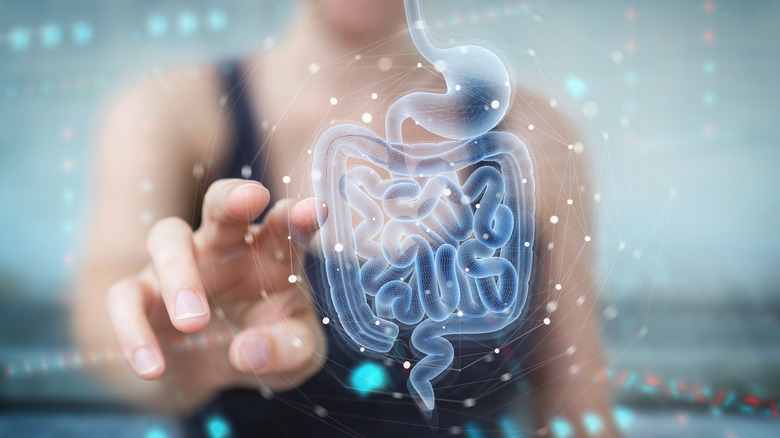What Is The Estrobolome And How Does It Affect Your Health?
There are trillions of bacteria cells found within the "gut microbiome" (via ScienceDaily). Out of that number, only approximately 8,000 strains of bacteria have been identified by researchers. Believe it or not, there are so many strains of bacteria that the microbiome contains departments dedicated to specific parts of the body such as the estrobolome — the center for regulating estrogen (via MindBodyGreen).
In short, the estrobolome metabolizes estrogen which is a key hormone, especially for women (via MindBodyGreen). It's often thought of as the bridge between balancing hormones and gut health since it creates an enzyme called beta-glucuronidase, which breaks down carbohydrates and aids in the intake of micronutrients (via Lleno Diagnostic Laboratory). Estrogen hormone is responsible for supporting the cardiovascular system, maintaining the reproductive system, and promoting cognitive and bone health (via Medical News Today).
However, when the estrobolome is removing too many female hormones, low estrogen occurs, "then you can have symptoms like heavy bleeding, uterine fibroids, breast tenderness, breast lumps, and cysts," shares certified family physician, Aviva Romm, via MindBodyGreen. Eliminating very little results in high estrogen, and increases the chances of blood clotting, and cancer (e.g. endometrial, ovarian, and breast cancer), Romm explains.
How to eat for your estrobolome
Eating for your estrobolome follows the same principles as does eating for your gut health. Even though gut health isn't clearly defined, according to a 2011 article published in BMC Medicine, a strong gastrointestinal barrier and diverse microbiome are crucial for a healthy gut.
The key is "keeping our microbiome healthy [...] with probiotics, prebiotic foods, lacto-fermented foods, and fiber is so important for a healthy estrobolome," points out Aviva Romm to MindBodyGreen. Some fermented foods include kimchi, yogurt, sauerkraut, kombucha, and more (per Lleno Diagnostic Laboratory). Additionally, you want to make sure your diet is filled with good sources of protein since this supports immunity, bodily growth, and helps stabilize blood sugar levels.
Lastly, incorporate plenty of foods that are anti-inflammatory and high in antioxidants (via Lleno Diagnostic Laboratory). Vegetables and fruits are loaded with antioxidants and vitamins. For optimal health, try eating the rainbow, since the various colors of fruits and vegetables each contain different minerals to support a diverse collection of microorganisms. However, keep in mind that estrogen levels do fluctuate in women due to menstruation, pregnancy, or menopause, shares Romm (via MindBodyGreen). Although eating a nutrient-dense diet will support your estrobolome and estrogen levels, it's always best to speak with your physician if you're concerned.


